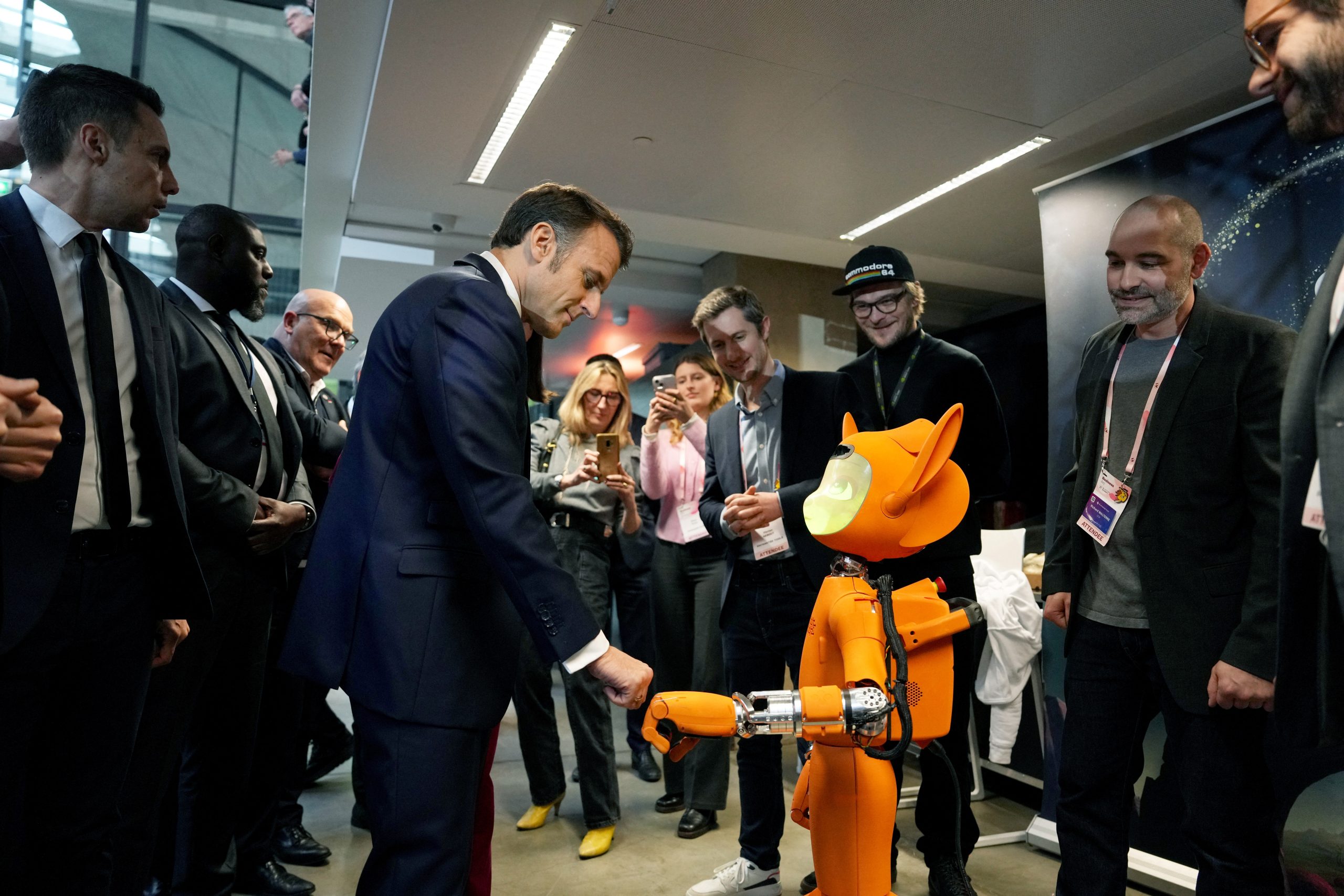Analysis: At the AI Action Summit, bragging rights for hosts but limited opportunities for stakeholders
Hosting an international tech summit brings great prestige, but direct engagement with stakeholders would have been more constructive
Analysis: At the AI Action Summit, bragging rights for hosts but limited opportunities for stakeholders

Banner: French President Emmanuel Macron bumps fists with a robot at the Artificial Intelligence Action Summit in Paris, February 11, 2025. (Source: Aurelien Morissard/pool via Reuters)
This week, the tech world’s attention was turned to the City of Light, which, following the UK and South Korea, hosted the third installment of the AI Action Summit. The French promised that the summit would be exciting for anyone interested in AI technologies. That excitement, however, was fleeting. After two days, the summit is now over, the world has moved on and France is left with one large, nagging, Olympic-size village of a question.
Was it worth it?
France has had a lot riding on the summit and, leading up to it, the hype was only growing stronger. This is understandable. AI-powered software is widespread in France and there is a vibrant AI start-up ecosystem in the country. According to France Digitale, France is home to around 590 AI start-ups which, in 2022 alone, collectively raised around €3 billion. A number of French companies, such as ContentSquare, Dataiku and Meero, are already dominate global markets, while MistralAI, France’s most successful company to date, has raised a record-breaking €385 million. For France, hosting the AI summit was a non-brainer.
The summit, co-hosted with the government of India, placed particular emphasis on inclusion, in particular civil society participation and, given the increasing number of multilateral fora for AI governance, this move was seen as extremely significant. The truth is, however, that the summit was not really multistakeholder and getting a ticket to participate was proven extremely difficult and challenging for any civil society organization. But even beyond the challenges in participation, the discussions were also not inclusive.
Specifically, governments did not interact directly with any stakeholders during the first day of the summit. Instead, they only met during the second day behind closed doors, and the communique that came out of the summit was the by-product of government-only input. What’s more, the summit appeared to be completely detached from the current state of geopolitics and there was hardly any mention to the growing tension between the way the United States is seeing the evolution of AI with that of the rest of the world. This tension only became apparent when news broke that the US decided not to sign the summit’s final communique, though the biggest surprise was the fact that the UK also did not sign it.
In all this messiness, therefore, the question that lingers is: Why are countries so eager to host these summits?
The easiest way to think of these summits is through the analogy of the Olympic Games. Hosting an Olympiad comes with high costs and resources, but the return – economic or otherwise – is not substantial. Host countries have to spend huge amounts of money on the construction of new facilities and stadiums and create a robust security and transportation infrastructure but what do they actually get back in return? There is certainly an element of increased demand during the Olympic weeks but studies have shown that, in general, host countries do not actually recover their economic costs. Still, they are eager to bring the Olympics to their own countries and that is because, in reality, there is a sense of pride associated with hosting the Olympics.
The same goes for AI. The governance and evolution of AI is everything anyone can talk about these days; governments are spending countless resources and money trying to figure out how to best regulate it without limiting innovation; companies are promising revolutionary products that would change people’s lives; and, civil society and academia are working hard to ensure users continue to have agency in a technology that seeks to undermine their empowerment. Hosting therefore an AI Summit places France in the middle of the AI conversations.
The truth is, however, that that these summits are not meant to have any real impact. They are not meant to bridge the existing gaps or find solutions to any of the complex issues presented by AI technologies. They are not designed to affect change or to produce anything of value. This may be tolerable if there were other venues where some of these issues were discussed and solutions were presented in an inclusive manner, but given that there are not, we may need to rethink how to best architect these summits and seize the opportunities they offer.
Just like in the case of the Olympics, hosting the AI Summit will certainly put a country on the map. Going beyond that, however, we need to re-engineer the process of how stakeholders are involved and the role they get to play in these gatherings. The question should be focusing on how to create tangible and action-oriented outcomes that have full stakeholder buy-in.
Cite this post:
Konstantinos Komaitis, “Analysis: At the AI Action Summit, bragging rights for hosting it but limited opportunity for stakeholders,” Digital Forensic Research Lab (DFRLab), February 11, 2025, https://dfrlab.org/2025/02/11/ai-summit-stakeholders/.

